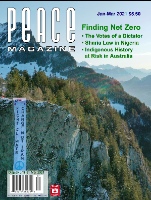
Peace Magazine Jan-Mar 2021, page 29. Some rights reserved.
Search for other articles by Andrea Budgey here
By Jon Tattrie. Goose Lane Editions, 2020, 216 pages
Jon Tattrie’s previous books have dealt with controversial figures in Nova Scotia history: Edward Cornwallis, the first governor of the province, Eddie Carvery, the “Hermit of Africville,” and Mi’kmaq activist Daniel Paul.
In Peace by Chocolate, Tattrie has been captivated by another sort of narrative, that of a Syrian refugee family who have settled in Antigonish and have opened the flourishing chocolate company after which the book is named.
It is not, however, merely a good news story about Canada’s refugee sponsorship programme. Tattrie situates the events of the family’s life in broader contexts—the history and chemistry of chocolate; the Arab Spring and its catastrophic sequelae in Syria; Mi’kmaq and Settler history; the role of the internationalist Coady Institute in the culture of Antigonish—before “zooming in” on Isam Hadhad, his passion for chocolate, and his family.
Readers are shown the corrosive effects of the Syrian civil war on public life, the destruction of the family home and factory, the painful decision to flee, and the paralysing insecurity of life in Lebanon for Syrian refugees.
Much of the story is told from the perspective of Tareq, one of Isam and Shahnaz Hadhad’s sons, a medical student before the war. He heard by chance about the WUSC (World University Service Canada) scholarship program, but turned down an offer which would have taken him, alone, to restart his education in Canada as an undergraduate; advocacy by an employee of the Canadian embassy eventually resulted in an offer of sponsorship to the entire family. It is clear just how much the family’s approval resulted from coincidence and individual intervention, and how strong is the temptation to resort to smugglers and “unofficial” processes for refugees in unsustainable situations.
The focus of the narrative then shifts to Canada, the Trudeau government’s commitment to admit 25,000 Syrian refugees, and the remarkable group of people who formed SAFE (Syria-Antigonish Families Embrace); they raised $10,000 in their first five days, researched, prepared, and built a supportive community of more than 200 volunteers.
Tareq travelled in December 2015, and most of the family a few weeks later; Tattrie very effectively captures the public euphoria about refugee sponsorship in Canada during this period. The family’s settlement process is recounted with a focus on the personal—the importance of the family’s Muslim faith and the respectful community response; there are charming anecdotes and stories of individual connection, but the difficulty of settlement is not underplayed.
Isam Hadhad coped by resuming his vocation as a chocolatier on a small scale, and the positive response to his product, combined with expert support and advice, and Tareq’s confidence and articulateness in interviews, led to the establishment first of a cottage industry, then a small factory, now a significant area employer. The family’s emphasis on community engagement led them to contribute to the relief effort after the fire in Fort MacMurray, and to Justin Trudeau’s mention of the company in a UN speech. This same orientation has led to fundraising partnerships with Paq’tnkek First Nation, Ottawa’s Refugee Hub, and various other initiatives, and the company website even features a “Pride Flag” six-pack!
By the book’s end, three households of the Hadhad family had been reunited in Antigonish, SAFE had embarked on 10 sponsorships, and Tareq had become a Canadian citizen. The positivity of the narrative is irresistible, but Tattrie also demonstrates the extent to which this particular success story is the result of one family’s extraordinary resilience, a community’s remarkable effort, a particular moment in public life, and a series of fortunate coincidences and individual initiatives. Canada’s refugee system does not provide this level of support to all.
Reviewed by Andrea Budgey, Humphrys Chaplain, Trinity College, U of Toronto.

Peace Magazine Jan-Mar 2021, page 29. Some rights reserved.
Search for other articles by Andrea Budgey here